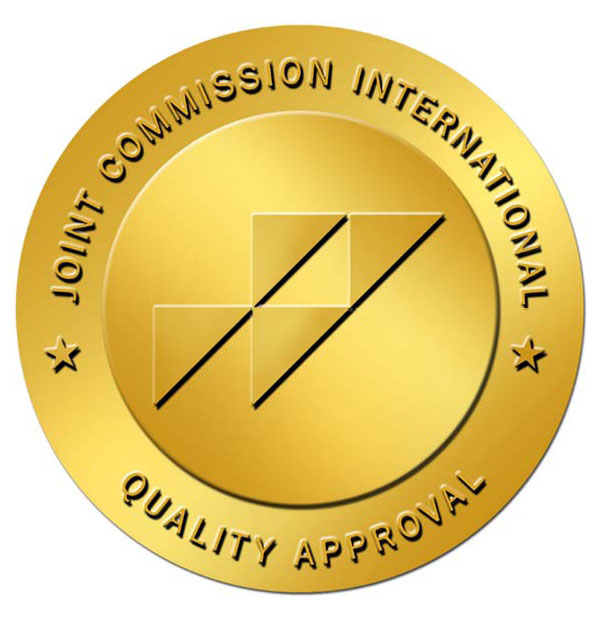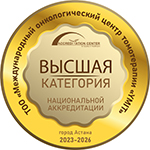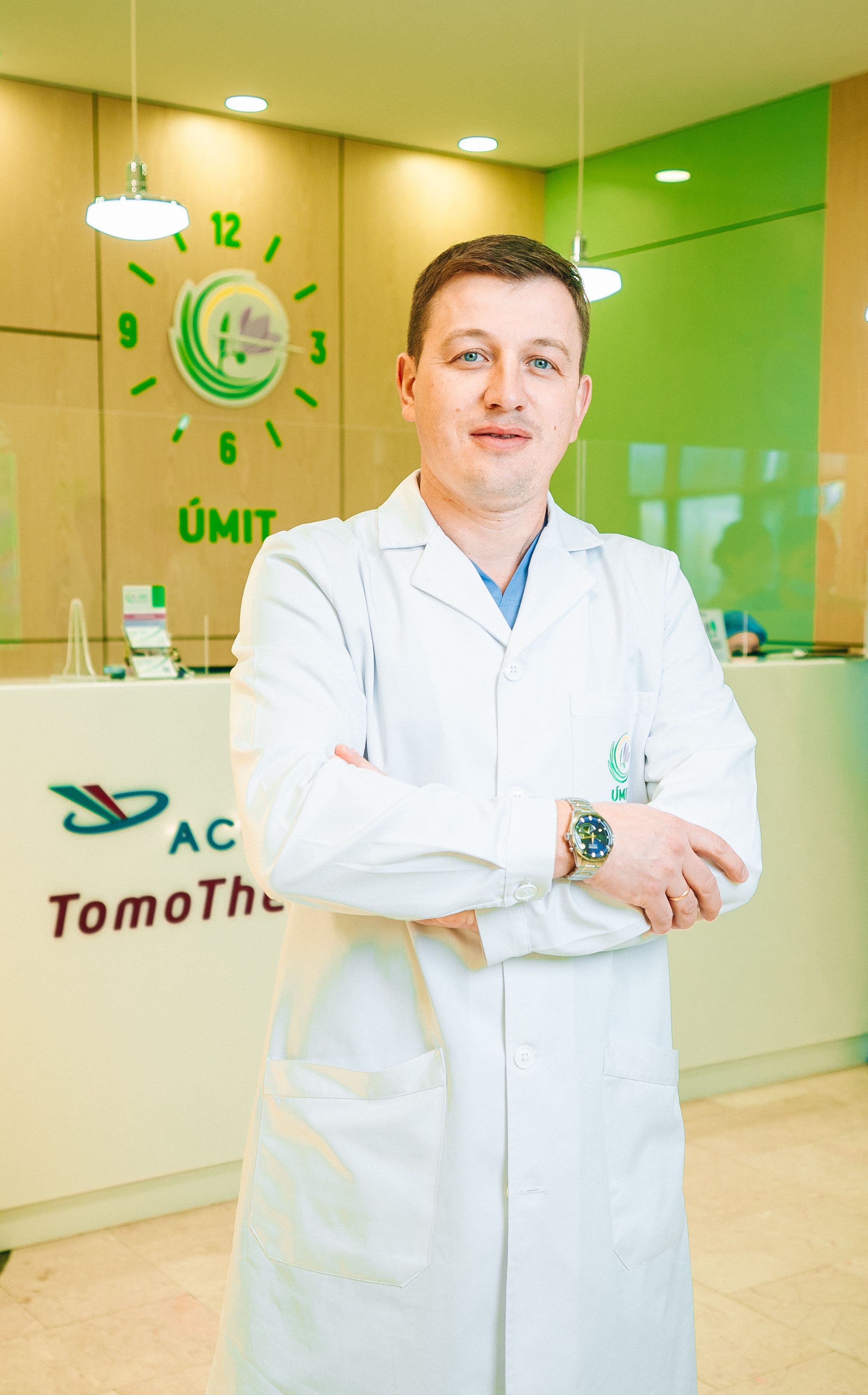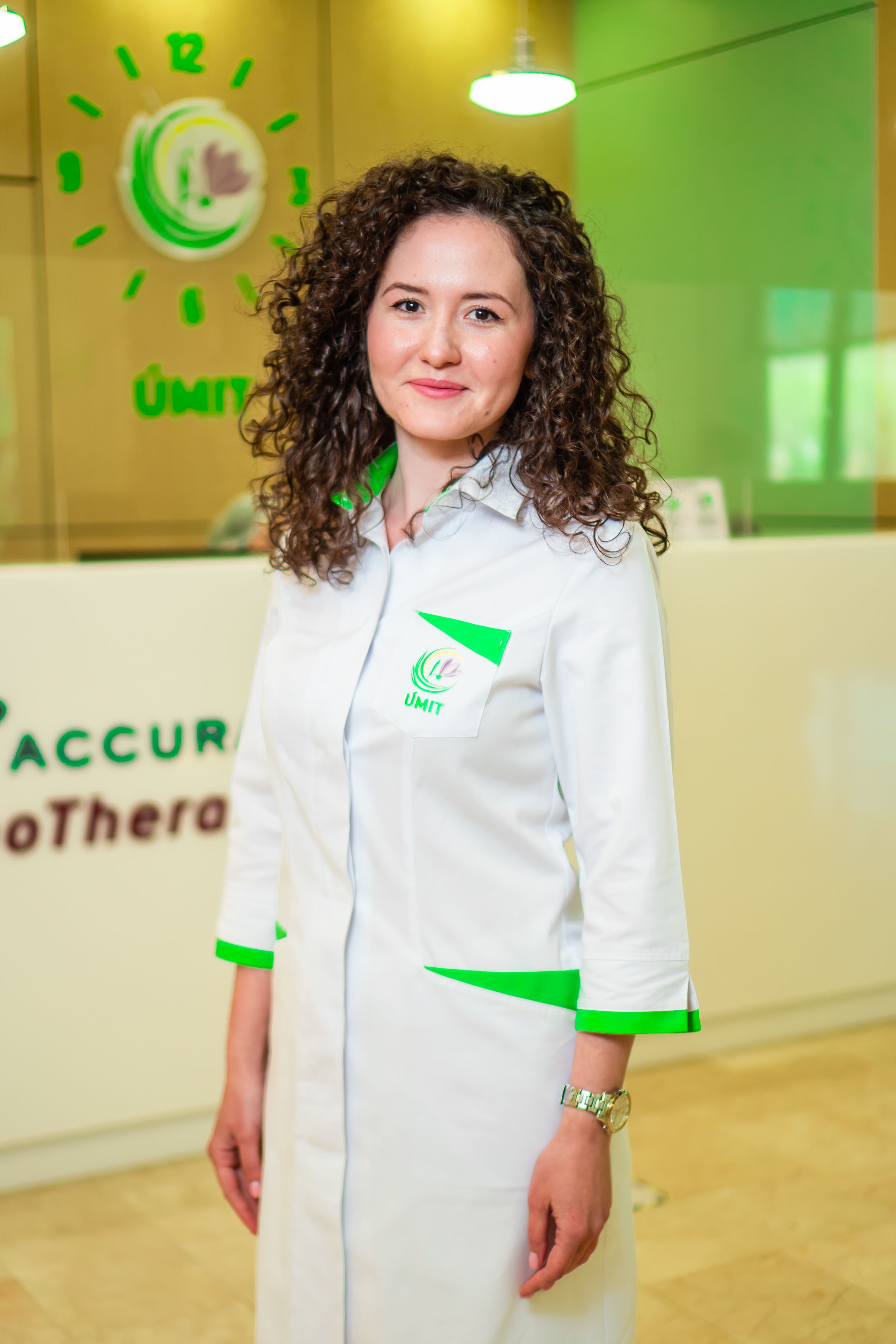Endoscopy with sedation
In our Center, all endoscopic examinations (both diagnostic and surgical) are performed under the most comfortable conditions of sedation - a 10-minute drug-induced sleep using special preparations. Endoscopy with sedation is performed under the control of an anesthesiologist, who carries out an individual selection of the drug and its intravenous administration.
During the procedure patient sleeps without any unpleasant sensations, and after recovery immediately upon its completion, does not feel discomfort
This is how all types of endoscopic examinations and manipulations are performed in Europe, because when patient is calm and does not interfere with the examination, the doctor performs the necessary diagnostic complex as quickly, accurately and efficiently as possible.
Within half an hour after completion of the procedure, the patient can return to normal activities. The procedure involves directly the endoscopist, assistant and anesthesiologist.
Before the examination, the endoscopist talks with the patient, gets acquainted with his medical documentation, explains what additional procedures are planned to be performed during endoscopy. Then the anesthesiologist conducts an additional survey and examination of the patient. After introducing the patient into a state of short-term sleep, the endoscopist conducts an endoscopic examination and performs additional diagnostic and therapeutic manipulations.
Indications for endoscopy
The list of indications for endoscopic examinations is very extensive. They are used in case of:
- symptoms of mucous membrane lesions (pain, indigestion, cough, etc.)
- bleeding
- suspected benign or malignant tumors
- suspected foreign bodies
- need to take a biopsy and other samples that cannot be taken otherwise
- minor procedures (excision of polyps, removal of foreign bodies), etc.
- preventive measures.
The range of indications for endoscopic surgery is very wide. Every year their number only increases due to the improvement of equipment and the growth in experience of doctors.
Therapeutic manipulations during endoscopy
The options of modern endoscopes allow not only high-quality diagnostics, but also a wide range of therapeutic manipulations:
- endoscopic removal of neoplasms (polyps, adenomas, etc., followed by biopsy) from the esophagus, stomach, small and large intestines, ENT organs, trachea and bronchi;
- ligation and sclerotherapy of the stomach and esophagus veins, control of bleeding from various parts of the gastrointestinal tract;
- irrigation and injection of medications;
- removal of foreign bodies and many other medical procedures.
Preparation for endoscopy
Before the appointment of the procedure, it is required to undergo an examination by a specialized doctor with the issuance of a referral. If you do not have a referral when you contact the clinic, you can make an appointment with a doctor to get it.
- ECG. For patients with cardiovascular system diseases, as well as patients over 50 years (especially for examination with sedation), it is advisable to undergo ECG or have data from a previously performed ECG (no later than 1 month).
- Complete blood count. Presence of a number of diseases in patient (coagulopathy, thrombocytopenia or portal hypertension) requires special attention during the diagnosis. The results of the blood test will be taken into account by the doctor during endoscopy
- Tests for infectious diseases. Tests for HIV, hepatitis and syphilis are standard during minimally invasive procedures (including endoscopy), before surgery and hospitalization
The above mentioned examinations are advisory in nature and aimed at identifying contraindications and ensuring maximum safety during endoscopic examinations. All examinations specified above can be made in our center.
Depending on the type of examination, the patient will need to keep a diet and/or relax the bowels.
Fibrocolonoscopy (FCS)
Colonoscopy (fibrocolonoscopy, FCS) is a modern instrumental method for examining the intestinal mucosa, allowing detecting the presence of a number of diseases with a high accuracy. This is the most accurate examination method, which has no analogues in terms of diagnostics and treatment. A special optical device – colonoscope is used for the examination. Its structural parts are a probe, illumination elements, air supply tubes, an eyepiece for transmitting video data, forceps for biopsy (sampling) and removal of foreign bodies, snares for polypectomy (excision of polyps). All modern devices are equipped with video cameras for taking pictures and transferring the image to the monitor screen installed in the procedure room or operating room.
Colonoscopy at the “Umit” Center is the use of all the unique possibilities of the procedure, during which a specialist examines the mucous membrane, assesses its tone and ability to contract, excludes or confirms the presence of a tumor, takes tissue samples for biopsy (examination), removes polyps (up to 1 mm), small benign neoplasms, extracts a foreign body, stops bleeding.
Performing examination “asleep”
We offer our patients “asleep” examinations. A patient falls into a short drug-induced sleep and does not feel any discomfort during the procedure and after it. Sedation is not anesthesia, it is easily tolerated by a patient and has practically no contraindications, the procedure is controlled by an anesthesiologist.
Goal of colonoscopy
Colonoscopy at the "Umit" Center allows identifying a number of diseases at early stages to exclude the development of serious complications.
The study allows the most accurate and timely diagnosis of almost all the most dangerous pathologies of the colon:
- inflammation (colitis, Crohn's disease)
- ulcers and erosion
- polyps and tumors
- intestinal bleeding, etc.
- When performing an endoscopic examination, the specialists of the center can take tissue samples for a biopsy.
Colonoscopy provides a unique opportunity to treat a number of pathologies without abdominal surgery.
Indications for colonoscopy
In addition to previously diagnosed cases of colon cancer and other serious pathologies, indications for a mandatory colonoscopy are as follows:
- suspicion of bowel disease (blood and mucus in feces, recurrent constipation or diarrhea, bloating and pain in the intestines)
- detection of feces occult blood
- increase in specific oncomarkers in blood tests
- anemia (low hemoglobin)
- sensation of a foreign body in the rectum
- low-grade fever (body temperature rise over a long period) of unclear etiology
- weight loss
- the need to monitor the treatment progress
- diagnosing of tumors, polyps and other neoplasms in the colon in relatives
- aged 45 and older (for the prevention of bowel cancer).
Colonoscopy “asleep”
Experienced doctors of the highest qualification work in the “Umit” Center. The doctors carefully monitor patient's reaction, choosing the pace of probe insertion, helping its passage by the abdominal palpation, etc. As a result, the insertion of a thin probe is performed with minimal discomfort. As for the possible painful sensations, they directly depend on the intestine state.
Often, emotional stress is more uncomfortable than the examination itself. If you are afraid that you will have discomfort, all problems can be solved by colonoscopy "asleep".
Colonoscopy "asleep" means that a patient falls into a drug-induced sleep. In our clinic, the newest drugs are used for this purpose. All of them guarantee the absence of discomfort and easy recovery. The examination is carried out under the supervision of an anesthesiologist, who performs an individual selection of the drug and its intravenous administration.
This is how all types of endoscopic examinations and manipulations are carried out in Europe, because when patient is calm and does not interfere with the examination, the doctor performs the entire necessary diagnostic complex as quickly, accurately and efficiently as possible. Our doctors have undergone additional training and qualification upgrade, the procedure is performed according to the world standards.
Duration of examination 20-30 minutes
Preparation of doctor’s conclusion 10-20 minutes
Results of the procedure: images and doctor’s detailed conclusion with a description of the large intestine condition
Gastroscopy (EGDS, esophagogastroduodenoscopy)
Allows to visually examine the mucous membrane of the esophagus, stomach and duodenum. The examination is performed using endoscope, which is a flexible probe with a built-in video camera, allowing the doctor to receive an image on the screen.
Gastroscopy equipment is highly sensitive. Doctor can detect changes on the surface of the mucous membrane of internal organs as small as a few millimeters. During the procedure, not only a visual examination is performed. If any neoplasms in the esophagus, stomach, duodenum are detected, the doctor takes samples of the mucous membrane and sends them for histological examination. In some cases, it is possible to remove epithelial formations (polyps) in the stomach and esophagus directly during diagnostic gastroscopy. The decision to remove is made based on the structure and size of the neoplasm. Benign neoplasms up to 1.5-2 cm (sometimes 2.5 cm) can be removed.
The information obtained during gastroscopy allows to make an accurate diagnosis and choose an adequate treatment method.
Goal of gastroscopy
The EGDS method is essential in the diagnosis of the esophagus, stomach and duodenum diseases. During gastroscopy, doctor can diagnose gastritis, all forms of peptic ulcer, esophagitis, GERD, as well as neoplastic processes even at early stages, unlike other methods that detect diseases at later stages of the disease. Due to modern endoscope, polyps and erosions are not only detected, but also effectively treated.
Additional functions of the endoscope allow to perform the following medical procedures:
- injections or spraying with medicines
- excision of polyps
- bleeding control
- treatment of the vascular and lymphatic system diseases
- solution of the narrowed esophageal lumen problem
- insertion of a special probe designed to supply the nutrient mixture into the stomach.
Indications for gastroscopy
The reason for gastroscopy can be:
- pain, heaviness in the stomach after eating or pain in the fasted state
- constant, exhausting heartburn
- profuse belching
- "unreasonable" weight loss or lack of appetite
- frequent nausea and vomiting
- unpleasant taste sensations
The WHO statistics shows an increase in the number of malignant neoplasms of the gastrointestinal system worldwide, therefore, after the age of 45, it is recommended to regularly undergo preventive EGDS, the price of which is many times less than the cost of treatment.
Gastroscopy “asleep”
In the “Umit” Center, patients have an opportunity to undergo gastroscopy “asleep”. For the procedure, general anesthesia is not used; in our clinic, gastroscopy is performed under the most comfortable conditions of sedation - a 10-minute drug-induced sleep using special preparations. Endoscopy “asleep” performed under the control of an anesthesiologist, who carries out an individual selection of the drug and its intravenous administration.
During the procedure patient sleeps without any unpleasant sensations, and waking up immediately after its completion, does not feel discomfort.
This is how all types of endoscopic examinations and manipulations are performed in Europe, including FGS and FGDS, because when patient is calm and does not interfere with the examination, the doctor performs the necessary diagnostic complex as quickly, accurately and efficiently as possible.
Preparation for gastroscopy “asleep”
- The most informative and correct esophagogastroduodenoscopy is possible only with the complete removal of all foreign substances that can distort the picture. Therefore, gastroscopy is usually performed on an empty stomach, with a preliminary 8-12-hour interval of abstinence from food and water. An exception is made only for emergency gastroscopy, for which a probe gastric emptying is performed.
- After an X-ray examination of the gastrointestinal tract using contrast agents, a period of up to three days should pass before the endoscopy.
- Before starting the procedure, endoscopist informs patient about the purpose of examination and explains features of manipulations. Gastroscopy is carried out after the patient falls into a drug-induced sleep.
- Endoscope and all instruments undergo multi-stage disinfection in antibacterial solutions, which completely eliminates the transmission of infection.
Examinations recommended before endoscopy
- ECG. For patients with cardiovascular system diseases, as well as patients over 50 years (especially for examination under sedation), it is advisable to undergo ECG or have data from a previously performed ECG (no later than 1 month).
- General blood analysis. Presence of a number of diseases in patient (coagulopathy, thrombocytopenia or portal hypertension) requires special attention during the diagnosis. The results of the blood test will be taken into account by the doctor during endoscopy.
- Analysis for infectious diseases. Tests for HIV, hepatitis and syphilis are standard during minimally invasive procedures (including endoscopy), before surgery and hospitalization.
The above mentioned examinations are advisory in nature and aimed at identifying contraindications and ensuring maximum safety during endoscopic examinations. For details, please contact the call center: +7 7172 95 44 84, +7 777 201 44 44
Reminder for patient
Esophagogastroduodenoscopy (EGDS).
EGDS is performed on an empty stomach. Between the last meal and EGDS there should be a mandatory break of 10 to 12 hours.
It is not necessary to follow a special diet before the procedure, but 2 days before the EGDS, it is recommended to exclude from your food: chocolate; alcohol; spicy dishes; nuts; seeds. In the evening, before the examination, it is recommended to have a dinner of easily digestible food (no salads) - until 18:00.
Preparation for EGDS on the day of the examination is to ban the intake of any food. In the morning, it is also not recommended to smoke and take medications in the form of tablets or capsules. The practice has shown that when smoking even one cigarette in the morning, the procedure is more difficult, patient's gag reflex increases and the amount of mucus in the stomach increases, which prolongs the examination time.
It is allowed before EGDS: brush teeth; undergo other examinations (for example, ultrasound); make injections, if they are necessary in the morning; take medications that can be dissolved in the mouth; 2-4 hours before the procedure it is permissible to drink water without gas.
Dress code: it is recommended to come to the procedure in advance, put off a tie, glasses, dental prosthesis (if any).
Preparation for EGDS of the stomach has some more important points. Dress loose clothing so that you can unfasten the collar and belt. The patient must have medications that are taken constantly, which can be drunk immediately after the procedure. It is also necessary to take, if available, previous examination data. If the patient has an allergy, he must inform the doctor. Patients with epilepsy and diabetes should warn doctors about the presence of these diseases before the examination.
Preparation for (EGDS)






 public offer
public offer












